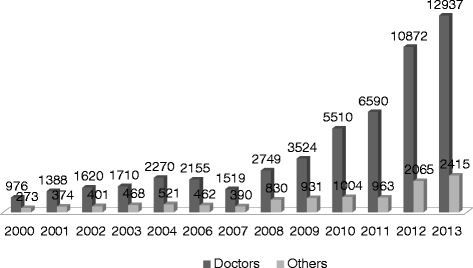Challenges to implementation of the WHO Global Code of Practice on International Recruitment of Health Personnel: the case of Sudan
- PMID: 27381022
- PMCID: PMC4943494
- DOI: 10.1186/s12960-016-0117-8
Challenges to implementation of the WHO Global Code of Practice on International Recruitment of Health Personnel: the case of Sudan
Abstract
Background: The WHO Global Code of Practice on the International Recruitment of Health Personnel (hereafter the WHO Code) was adopted by the World Health Assembly in 2010 as a voluntary instrument to address challenges of health worker migration worldwide. To ascertain its relevance and effectiveness, the implementation of the WHO Code needs to be assessed based on country experience; hence, this case study on Sudan.
Methods: This qualitative study depended mainly on documentary sources in addition to key informant interviews. Experiences of the authors has informed the analysis.
Results: Migration of Sudanese health workers represents a major health system challenge. Over half of Sudanese physicians practice abroad and new trends are showing involvement of other professions and increased feminization. Traditional destinations include Gulf States, especially Saudi Arabia and Libya, as well as the United Kingdom and the Republic of Ireland. Low salaries, poor work environment, and a lack of adequate professional development are the leading push factors. Massive emigration of skilled health workers has jeopardized coverage and quality of healthcare and health professional education. Poor evidence, lack of a national policy, and active recruitment in addition to labour market problems were barriers for effective migration management in Sudan. Response of destination countries in relation to cooperative arrangements with Sudan as a source country has always been suboptimal, demonstrating less attention to solidarity and ethical dimensions. The WHO Code boosted Sudan's efforts to address health worker migration and health workforce development in general. Improving migration evidence, fostering a national dialogue, and promoting bilateral agreements in addition to catalysing health worker retention strategies are some of the benefits accrued. There are, however, limitations in publicity of the WHO Code and its incorporation into national laws and regulatory frameworks for ethical recruitment. The outlook is bleak for Sudan unless the country designs and implements a robust national policy for migration management and unless prospects for source-destination country collaboration improve within a more sound version of the WHO Code.
Conclusions: The WHO Code catalysed some vital steps in managing migration and strengthening the national health workforce in Sudan. Nevertheless, the country has not utilized the full potential of this instrument. Revisions of the WHO Code would benefit much from lessons of its application in the context of developing countries such as Sudan.
Keywords: Health workforce; Migration; Sudan; WHO Code.
Figures
References
-
- World Health Organization. WHO Global Code of Practice on the International Recruitment of Health Personnel. Geneva: WHO; 2010. http://www.who.int/hrh/migration/code/WHO_global_code_of_practice_EN.pdf.
-
- Tankwanchi AB, Vermund SH, Perkins DD. Has the WHO Global Code of Practice on the International Recruitment of Health Personnel been effective? Lancet. 2014;2(7):e390–1. - PubMed
-
- Federal Ministry of Health. Annual statistical report 2014. The National Centre for Health Information. Khartoum: FMoH; 2015.
MeSH terms
LinkOut - more resources
Full Text Sources
Other Literature Sources


